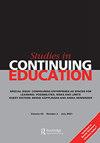“无内容的课程”教学:高等教育重组的关系主体取向
IF 1.9
4区 教育学
Q2 EDUCATION & EDUCATIONAL RESEARCH
引用次数: 0
摘要
摘要高等教育的管理变革往往意味着实施新的教学模式,包括体验式教学和协作式教学。大学教师代理对于管理和实施高等教育改革至关重要。作为这些变化的一部分,合作需要一种特定的代理,即关系代理。本文的目的是通过研究大学教师在高等教育重组中的关系代理取向,将关系代理概念化。这些数据来自芬兰一所大学教育学院的一门新颖的大众课程,该课程是全大学学习计划重组的一部分。该课程由一群教师共同组织和教授,没有预先定义的内容。基于不同活动对象(自己的、他人的、部分共享的)的扩展与教师对这些扩展的评价(语用适应性、批判性、发展变革性)之间的交叉点,构建了教师访谈中主体取向的类型学。教师主要关注学生学习和扩大学生学习活动的对象,这将关系代理的重点扩展到不仅在他人身上寻求资源,而且成为他人的资源。本文章由计算机程序翻译,如有差异,请以英文原文为准。
Teaching ‘a course without content’: relational agentic orientations to reorganisation of higher education
ABSTRACT The managerial transformation of higher education often means implementing novel modes of teaching and learning, including experiential and collaborative teaching. University teachers’ agency is crucial for managing and enacting changes in higher education. Collaborating as part of these changes requires a specific kind of agency, namely relational agency. The aim of this paper is to conceptualise relational agency by studying the relational agentic orientations of university teachers towards a reorganisation of higher education. The data come from a novel mass course at a faculty of education in a Finnish university, which emerged as part of a major university-wide reorganisation of study programmes. The course is organised and taught collaboratively by a group of teachers, and has no predefined content. A typology of the agentic orientations in the teachers’ interviews was constructed on the base of the intersections between the expansions of different objects of activity (one’s own, others’, partially shared) and the teachers’ evaluation of these expansions (pragmatic-adaptive, critical, developmental-transformative). The teachers focused primarily on student learning and on expanding the object of student learning activity, which extends the focus of relational agency to not only seeking resources in others but also being a resource for others.
求助全文
通过发布文献求助,成功后即可免费获取论文全文。
去求助
来源期刊

Studies in Continuing Education
EDUCATION & EDUCATIONAL RESEARCH-
CiteScore
4.70
自引率
6.70%
发文量
22
期刊介绍:
Studies in Continuing Education is a scholarly journal concerned with all aspects of continuing, professional and lifelong learning. It aims to be of special interest to those involved in: •continuing professional education •adults learning •staff development •training and development •human resource development
 求助内容:
求助内容: 应助结果提醒方式:
应助结果提醒方式:


